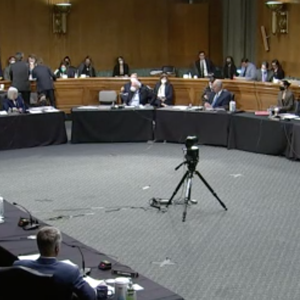By Tom Rosenthal
Drawing on the lessons learned from the COVID-19 pandemic—both what to do and what not to do—the Senate Committee on Health, Education, Labor and Pensions favorably voted 20-2 to advance the Prepare for and Respond to Existing Viruses, Emerging New Threats, and Pandemics Act (PREVENT Pandemics Act).

“Two years after the COVID-19 pandemic was first declared a public health emergency, we are in a better position today than ever before, to move past this crisis," said Sen. Patty Murray (D-Wash.), the committee chair. “Vaccination rates are up across the country. Over 81% of those eligible are vaccinated with one dose and nearly 70% are fully vaccinated. Case rates are down. Schools are open—with nearly 100% of schools safely back to in person learning.
“And people are getting back to their lives," she said. “But we all know how long of a road it’s been to get here, how many loved ones we have lost along the way, and how much damage a crisis like this can do if we are not ready. After all our families have been through, we owe it to everyone who has worked so hard to get us through this pandemic to take action so we are never in this situation again,” Ms. Murray said.
“As we continue to evaluate the lessons learned from the pandemic, the central issue facing us today is how we can better anticipate the next threat we will face, and innovate quickly enough to rise to the challenge,” added Sen. Richard Burr (R-N.C.), the committee’s ranking member.
“This bipartisan legislation represents a milestone in our efforts to fill current gaps and build on the successes in our pandemic response,” Mr. Burr said. “With this bill, Congress can help ensure America has better tools, better resources, and stronger leadership for the next threat we will inevitably face.”
The bill does not allocate funds to implement its proposed programs, but the cost is estimated in the billions at a time when Congress cannot agree to President Joe Biden’s request for an immediate allocation of $22.5 billion to keep up the pace combating the current pandemic.
The PREVENT Pandemics Act proposes to improve strategy and coordination among public health preparedness agencies. In addition, it proposes to revitalize the public and community health workforce.
The bill also calls for improvements that enable better detection and monitoring for emerging infectious diseases and other threats by enabling updates to public health data to quickly provide comprehensive, actionable insight during public health emergencies.
“Another challenge throughout this pandemic has been outdated and incompatible data systems and incomplete demographic data, which left public health experts without the information they needed to make critical decisions,” Ms. Murray said.
“That’s why our legislation directs CDC to develop public health data standards, and work with public health departments to develop best practices for improving data availability, quality and completeness,” she added. “It also strengthens our ability to use data to identify viruses and new variants, and predict and prevent disease outbreaks.”
The bill also proposes to enhance the development and review of tests, treatments and vaccines as well as mitigate critical shortages of medical products. The bill meets this goal by “simplifying the application review process for technologies that can be adapted to different needs and improving access to the samples of specimens needed to develop diagnostic tests,” she said.
The bill also proposes the creation of the Advanced Research Projects Authority for Health to support cutting-edge, advanced biomedical research, which was first proposed by Mr. Biden last year.
The bill supports developing treatments and devices that may be needed in public health emergencies and antivirals for pathogens with pandemic potential. It establishes best practices and strategies when preparing for and responding to emergencies. The bill also addresses antimicrobial resistance through increased laboratory capacity, coordination regarding the blood supply and research on long-COVID.
Several proposals in the measure have political overtones. The bill would require Senate confirmation of the CDC director and an Agency-wide Strategic Plan. The measure would create an independent task force to conduct a comprehensive review of the current COVID-19 response. The bill also would place the overall coordination of the government’s pandemic response within the White House, creating what Mr. Burr called a “mission control.”
Other provisions in the proposed bill would:
- address disparities that make public health emergencies more challenging for at-risk populations and communities;
- improve public health communication and address misinformation; and
- ensure continued access to mental health and substance use disorder services during public health emergency responses.
Sen. Rand Paul (R-Ky.) used the hearing to launch another attack on Anthony Fauci, MD, the director of the National Institute of Allergy and Infectious Diseases (NIAID), by proposing an amendment to strip the government’s top infectious disease expert of his position and divide the NIAID into separate agencies. The proposal was overwhelmingly defeated.
{RELATED-HORIZONTAL}
